Home » Cost Guides » Oregon Cost Guides » How Much Does it Cost to Build a House in Portland?
Also known as the City of Roses, Portland is the largest city in Oregon. Its surrounding mountains and coasts, as well as the art and music scene, provide locals and tourists with numerous outdoor activities to enjoy. The city’s employees are also enjoying the effects of a steady economic recovery, which is resulting in strong wage gains.

The Cost of Building a Custom Home in Portland
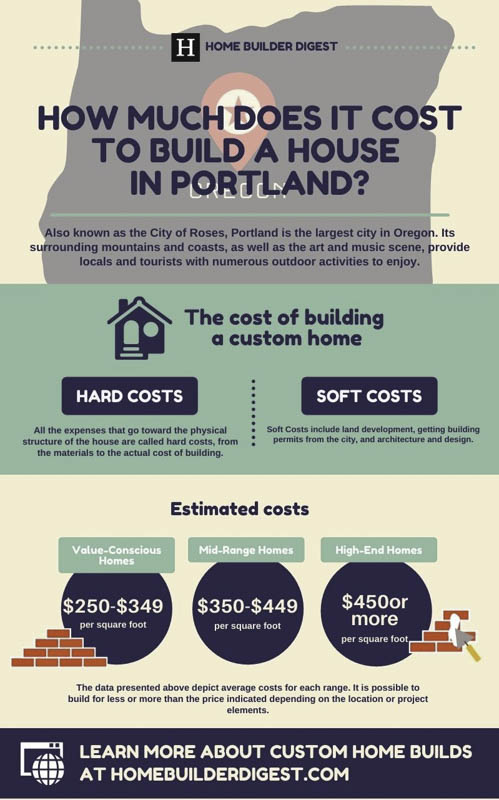
Portland’s economy is expected to reach full employment within a year. This comes as a relief for many sectors like the real estate and new construction industries, which are struggling to keep up with the high demand of activity. In recent months, Portland has become a seller’s market due to the limited supply of homes available. The competitiveness between buyers has increased prices. Home values have reportedly gone up by 19.9% in the last 12 months. Given the competitiveness of the housing market, limited inventory of ready-to-move-in homes, and increasing prices, ground-up construction is becoming more attractive to homeowners.
Market experts are also expecting a surge in new home construction due to the permits backlog being processed. Around 707 permits were issued between January 1, 2021 and November 28, 2021 based on Portlandmaps.
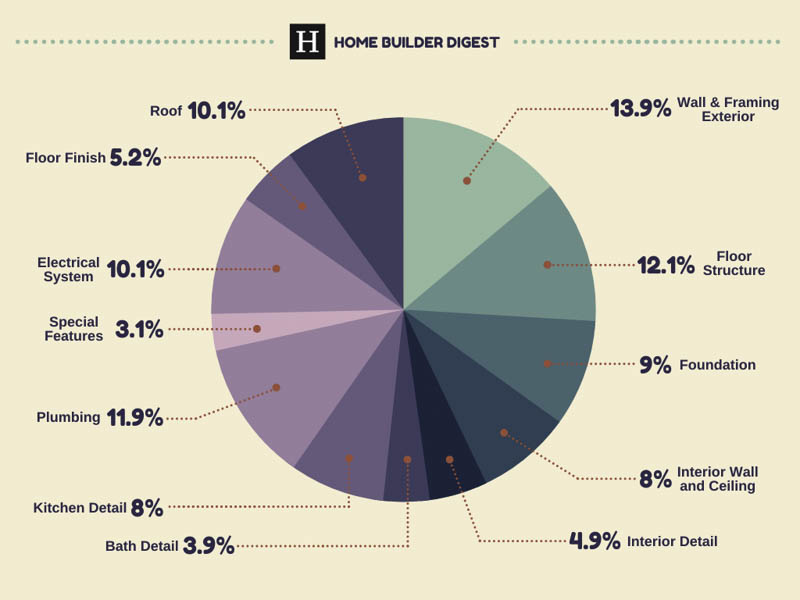
Figure 1. Typical cost breakdown of a single-family home constructed using the conventional method, according to Home Builder Digest. Image
The national average for new home construction is about $100 to $155 per square foot. Portland’s basic construction cost, meanwhile, is priced at $168 per square foot. A more customized home would cost about $289 per square foot while a high-end customized home would cost at least $373 per square foot. The overall cost will also be dependent on several factors like location and partnering construction and architectural firms.
Homebuilders will have to consider two types of costs when building a home. The first is the hard costs, which cover the physical factors of the home construction. These are typically things like framing, foundation, plumbing, roofing, and flooring. The second is soft costs; these cover everything else like architecture and design fees, permits, and custom features. Hard and soft costs fluctuate independently so homebuilders should always prepare for unforeseen changes.
Hard Costs
Get a free cost estimate
Basic construction fees will be dependent on the firms, but the estimated costs for construction begin at an average of $168 per square foot for value-conscious homes. This can go up to $289 per square foot for more customized homes, with the more expensive and fully customized projects reaching $373 per square foot. Meanwhile, construction costs in the Portland Metro area have different estimates. The pricing can start at $159 per square foot and go up to $312 per square foot.
The actual overall cost will also be affected by different variables. In terms of hard costs, these include materials, labor, site, landscaping, and other physical aspects of home construction. Some firms will offer different pricing points for certain projects and job specifications.
For Portland-based firm Propel Studios, the construction of a custom Portland home starts at $350 per square foot. A 2,500 square foot home would then cost roughly $875,000 in total. Timurland Construction stated that custom home construction can be anywhere between $250 and $450 per square foot, which provides a range for more value-conscious and high-end clients.
Costs are expected to continue increasing due to labor shortage, supply chain disruptions, high inflation, and interest rate increases. The cost of materials also continues to affect construction pricing. While prices for materials like lumber are slowly going down, the effects of its increased pricing will persist long-term. Material costs are generally 50% of the total budget, while the labor cost is 30 to 60% of the construction budget. Labor can also be priced at $16.75 per hour. Some other hard costs include framing, which typically costs $20,000 to $50,000, and roofing, which has a minimum cost of $3,121 and can reach $12,267.
Homebuilders should plan and budget carefully to minimize project delays and additional costs.
Soft Costs
Get a free cost estimate
Soft costs encompass the non-physical facets of home construction. These are usually land development costs, permit costs, and design and architectural costs.
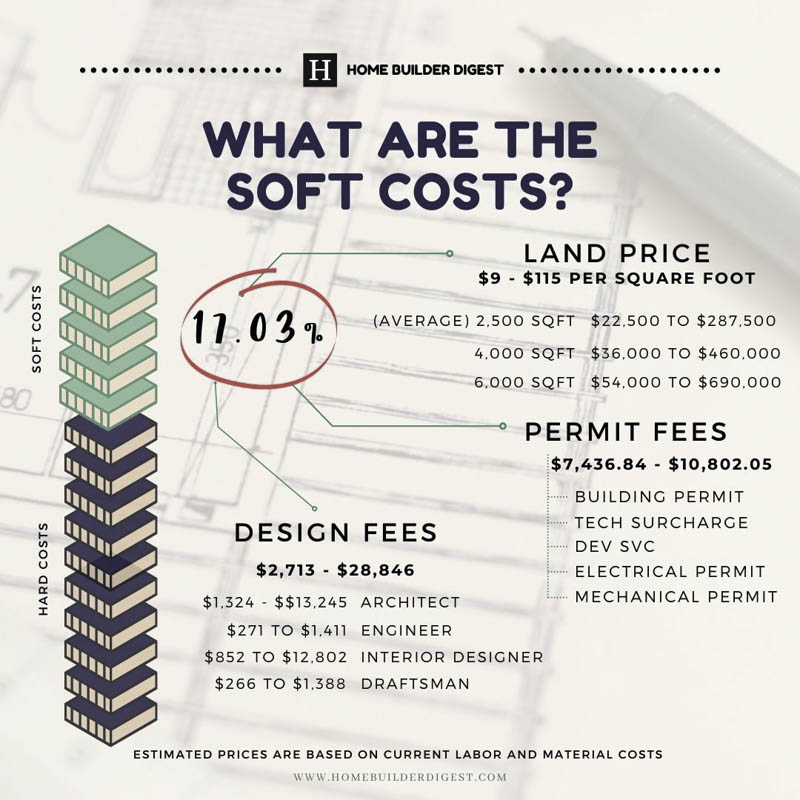
Figure 2. Soft cost percentage and average price range of additional fees, determined from the overall cost of custom home building in Portland.
Cost of the Land
Portland is projected to gain about 105,000 to 136,000 new households by 2035. That comes out to 3,500 to 4,500 new housing units per year, which comes alongside a 25-year demand for the development of 3,200 to 4,100 acres of land.
The rising demand for homes is likely to cause the price of land to go up in Portland. Most lots in the city will vary between $75,000 to $500,000, but some areas will cost more or less. The average cost of land in Portland is $170.29 per square foot.
About 400 homes were put up for sale in mid-October 2021 on Zillow. These homes were priced at $500,000 or lower. There were also 100 lots for sale priced below $300,000; most of the lots are located in urban areas and require little site work.
Landwatch has 42 listings for lots priced between $250,000 to $499,999. Out of these listings, 40 lots are underdeveloped and are 10 acres or less. Redfin meanwhile has lots that go for as low as $69,000 and as high as $2,790,000. Some lots may have similar sizes, but prices will differ based on location.
Permits and Other Fees
Building permits for Portland can be filed for on the local government’s official website. The process can be done both in-person and online. There is also a section on the website where a list of the different fee schedules can be found. Those with tighter finances and/or low income may also apply for permit fee waivers.
Permit costs will depend on the total value of construction work to be performed. The following figures are residential development fees from the Building and Other Permits Fee Schedule:
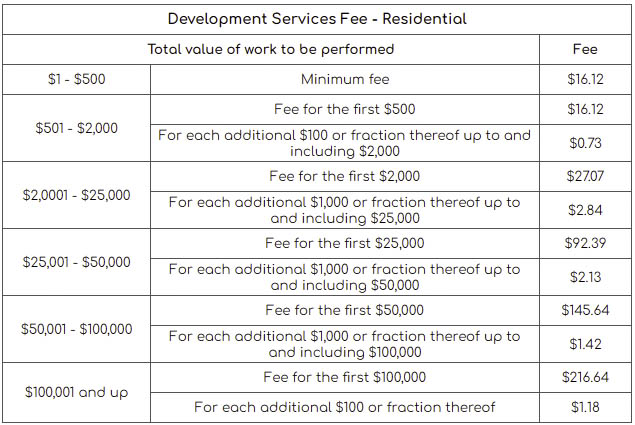
Portland’s local government also has a section on the official website dedicated to guiding homeowners through the process of filing for residential building permits. Homeowners are advised to secure permits as soon as possible due to a possible wait time of an additional six months.
Architecture and Design Fees
Homeowners are recommended to budget about an additional 10 to 15% of the expected total construction costs for architectural design fees. New construction projects will typically call for 10%, but more complex sites are more likely to call for 15% of the overall costs. This budget can also serve to prepare for any possible complications along the line.
Principal of ICON architecture/planning llc, Dan L. Goodrich, American Institute of Architects (AIA), National Council of Architectural Registration Boards (NCARB), also shared similar figures. For the firm, fees cost 6 to 10% of the board and nail construction cost. Value-conscious designs are $175 per square foot while mid-range designs are $250 per square foot. High-end designs meanwhile are $400 per square foot.
Phil Chek, founder of Phil Chek & Associates, estimates that it costs $2 to $3 per square foot to design a new home or home addition. According to him, this pricing is the same whether the project is value-conscious or high-end. Stamped engineering drawings, meanwhile, cost $1 per square foot.

How do custom home building trends in Portland compare to nearby cities?
Data from the last five years gathered from online contractor marketplace BuildZoom (BZ) show that the average cost to build a house in nearby areas tends to be higher than in Portland. For reference, the average cost for Portland is around $182,863.33 with a low of $170,130 and a high of $204,570.
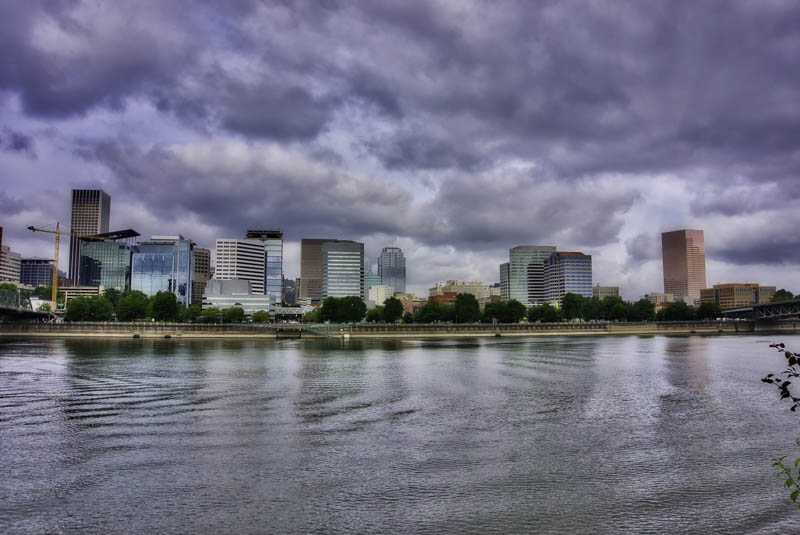
In Milwaukie, the average cost is $265,250. The lowest cost for the area is $196,000 while the highest cost is $1,061,000. Gladstone has similar figures with the average cost being $118,715. It has a low of $86,250 and a high of $712,290.
West Linn has much higher costs, with an average of about $461,795.11. The lowest cost for West Linn is $146,793, which can also reach up to $1,400,000.
What Leading Custom Home Builders and Architects that Serve the Portland Area Say
Get a free cost estimate
President of Eslinger Homes Chad Eslinger shared his firm’s forecasts for the construction industry in Portland, saying that strong demand will persist. Eslinger also shared about his expectation for the supply side: that supply of new homes will remain well under “what we should be producing to replace aging inventory and new household formation,” as it has been for a few years now.
The limited skilled labor pool will also affect the undersupply of inventory. Portland’s metro area displayed a high demand for subcontractors, which has been the case for the last eight to nine years. Eslinger has experienced fatigue across the construction trade due to the long work hours and massive demand.
Cost trends have been observed to continue to go up as time passes. There is an assumption that manufacturers are raising prices to make up for the times they could not in the past.
“Frankly, it scares me for the future of our industry because prices don’t come down once they are raised, with a few exceptions like lumber, which is the truest commodity we work with in its raw form,” Eslinger said.
Eslinger has set up a resource for homeowners to learn more about the construction industry in depth. His project is called Construction Flow.
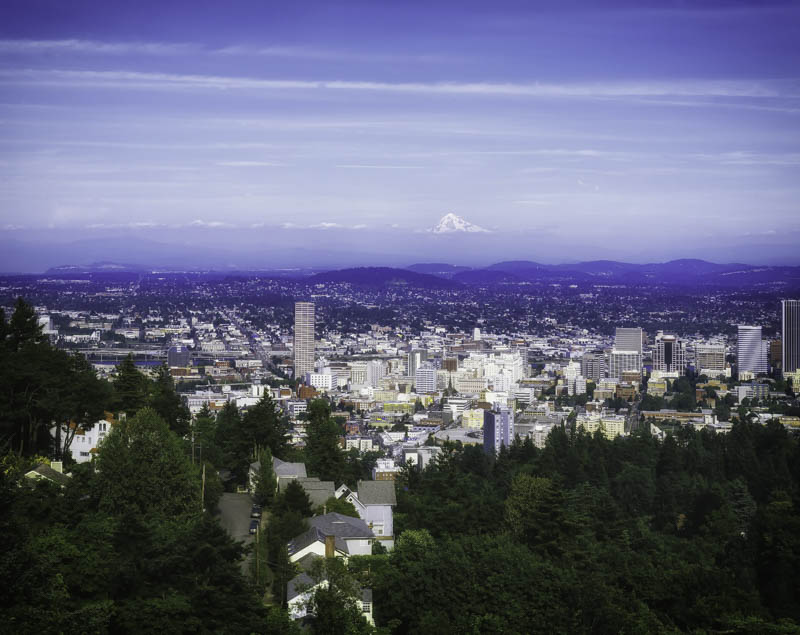
Gerald L. Rowlett, Owner of luxury home developer Westlake Development Group, LLC, shared figures for luxury projects. Value-conscious figures for luxury projects begin at $300 per square foot while mid-range projects can go anywhere from $325 to $375 per square foot. The upper range for luxury projects is priced at $400 to $600 per square foot and beyond.
In terms of the state of the construction industry, Westlake Development Group has noted the market remains robust despite the lagging home inventory.
“That being said, the last 12 months have been very challenging in the construction industry with constant price increases for both labor and material. The construction industry also continues to struggle to keep up with materials in short supply,” Rowlett added.
The last decade experienced more modest but impactful price increases at three to five percent yearly. Rowlett said, “The near future market can anticipate a squeeze on the lower end that may soon push up the chain. Most housing markets depend on move-up buyers. When the bottom gets cut off with inflationary increases, it starts to impact what people can afford on the move-ups.”
The interest hikes will pose a concern for the market. Equity and constant market flow came from the beneficial interest rates of the last two decades, but Rowlett expects future interest rates to leave a massive blow to the housing market.
Still, Rowlett has also noted how consumers have adapted to the new work at home environment. This has resulted in demand for home offices and children’s learning centers. There is also a higher desire for maximum natural light. These designs are calling for flexibility and innovation. For Westlake Development Group, this has culminated in what it calls the Dubai approach. Rowlett says, “…In Dubai they build islands with a maximum amount of shoreline allowing as many waterfront properties as possible.”
The Future of Portland’s Residential Construction Industry
Get a free cost estimate
Housing costs are expected to continue increasing for the foreseeable future. Several factors play into this prediction, one of which is related to materials. The construction industry is facing not only a limited supply of materials but also an increase in material costs and delays in lead time.
Many manufacturers experienced a halt or slow down to their operations due to the COVID-19 pandemic. This has played a major role in the construction industry’s struggle to maintain supplies for the increased housing demand.
There is still a lack of essential materials for the construction industry like paint, front doors, electrical boxes, insulation, and appliances. The lead time for the appliance delivery has gone up from two to three weeks to 12 to 16 weeks, which has severely impacted the time it takes for the construction industry to finish projects. Some contractors have turned to buying materials from online stores. Without certain materials, some projects cannot reach completion and other projects cannot begin.
Another factor that plays into the increasing housing costs is the limited pool of skilled labor. The labor shortage is driving up construction wages, which is affecting the overall cost of construction. Many people are no longer part of the workforce and have stopped looking for jobs.

Energy Efficient Homes
There has been an all-electric home movement in Oregon. This movement is coming from higher awareness of environmental issues, cost-saving reasons, and an uptick in the desire for better indoor air quality. Some households in Oregon are adapting modernized homes while others are seeking out new construction with 100% electric power.
It has been noted that builders and homeowners of larger and more expensive homes are beginning to take part in the electric home movement. The movement is also taking place during Oregon’s recent update to its building code requirements, which are known as the most demanding in America. Oregon-based developers and builders that specialize in high-performance homes are noted to surpass these requirements.
Housing Policies
August 1, 2021 saw Portland’s Residential Infill Project come into effect. This allows the construction of more housing types in what used to be single-family zoned neighborhoods. In January 2022, Oregon Senate Bill 458 will make it easier for property owners to split their lands into multiple lots, which will have a similar effect as the Residential Infill Project. June 2022 will then see Oregon House Bill 2001 come into effect. This will eliminate single-family zoning in Oregon’s larger cities. Put together, these three policies are expected to bring big changes to the housing market and shortage.
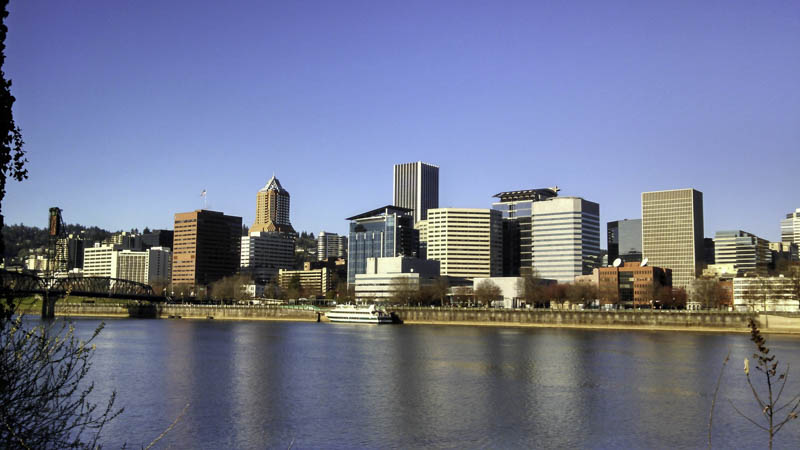
The three policies are seen to help Portland face challenges posed by the growing climate crises that bring wildfires and winter storms, the transportation crisis’ traffic congestion and carbon emissions, and the generational crisis that makes housing traditions unable to serve the current needs of America.
Considering building a home in Portland?
Contact us for a free consultation

